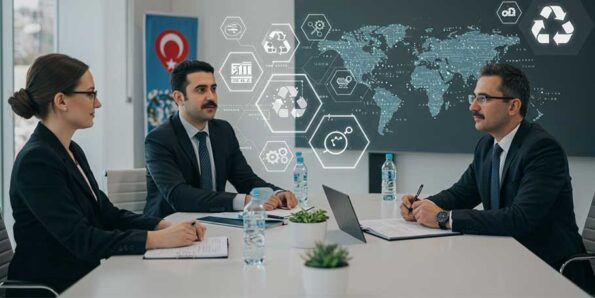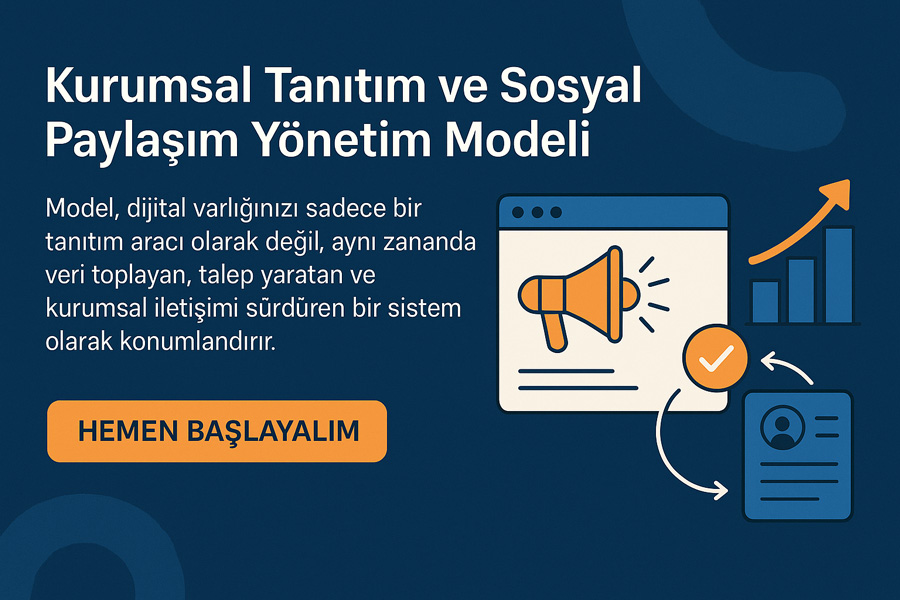Establishing a Recycling Machinery Manufacturing Factory does not only mean opening a production facility, but also investing in the economy of the future. Sustainable production and environmentally friendly investments are becoming increasingly important in the world. The recycling sector has become an area that both reduces environmental impacts and reduces carbon footprint and offers high profitability for investors. 🏭💡 As Adapte Dijital, we offer digital consultancy services to investors and entrepreneurs who want to enter this sector.
What to Consider When Establishing a Recycling Machinery Manufacturing Factory?
Establishing a recycling machinery manufacturing factory requires a lot of technical and strategic planning. In the factory establishment process, there are critical steps such as facility location selection, procurement of machinery and equipment, determination of production processes and fulfillment of legal requirements. 📈 Especially recycling machines can be customized for different materials and consist of systems that can process various wastes such as plastic, metal, glass and paper. Energy-efficient machines can be preferred to optimize production costs and create a sustainable business model.

Recycling Machines and Production Technologies
Recycling machines are divided into different categories such as automatic and semi-automatic systems, modular production lines and high-capacity machines. In machine selection, the production capacity and recycling type your business targets are of great importance. For example, plastic recycling machines break down pet bottle and packaging waste and turn them into granulated raw materials, while metal recycling machines allow scrap metals to be reprocessed. 🔄 At this point, conducting sectoral analysis and examining the machines used by competitors will also provide a great advantage.
This article provides a guide roadmap for entrepreneurs considering entering the recycling machinery sector, while also revealing ways to make your factory more efficient with digital consultancy. 🌱♻
İçindekiler
Adapte Dijital’in 10 yıllık deneyimiyle geliştirilen bu model, kurumsal web sitenizi sadece tasarlamakla kalmaz;
onu data toplayan, talep yaratan, kurumsal iletişim sağlayan bir dijital yönetim altyapısına dönüştürür.
Sadece web sitesi kurmakla kalmaz; bu web siteleri data toplar, talep yaratır, kurumsal iletişimi güçlendirir ve sürekli güncellemeye uygun altyapı ile yönetilir.
Recycling Machinery Factory Establishment Process
Establishing a recycling machinery manufacturing factory offers great opportunities for investors who want to create an environmentally friendly and profitable business model. However, establishing a recycling machinery manufacturing factory requires detailed planning and a strategic approach. Factory establishment is not limited to just purchasing machines or creating a production line; it also includes many critical elements such as compliance with legislation, market analysis, calculation of investment costs.
To establish a recycling machinery manufacturing factory, it is important to choose the right production area, determine the appropriate machinery and equipment, and develop an efficient business model. In addition, since the recycling machinery sector is divided into different areas such as plastic, metal, glass, paper and industrial waste recovery, the area where production will be made must be determined in advance and market analysis must be done meticulously.
📌 Basic points to consider in the process of establishing a successful recycling machinery factory:
- Investment Planning: A feasibility report must be prepared according to the production capacity and the return on investment period must be calculated.
- Machine Selection: Automatic or semi-automatic recycling machines should be determined according to investment costs and operating expenses.
- Raw Material Source: Which recyclable waste will be processed and from which sources these wastes will be provided should be clarified.
- Legal Processes: Factory license, environmental permits and work safety regulations should be complied with.
A recycling machines Establishing a manufacturing plant not only contributes to the environment, but also offers the opportunity to gain financial gain by establishing a presence in the rapidly growing recycling sector. 🌱💰
First Steps for Factory Investment
Before making a recycling machinery factory investment, it is of great importance to prepare a detailed business plan. Taking the first steps correctly will ensure that the factory operates with a sustainable model in the future.
🏗️ The first steps to be taken in the factory establishment process are as follows:
1️⃣ Conduct Needs Analysis: The type of recycling machinery to be produced should be determined. Different production areas such as plastic, metal, paper or electronic waste recycling machines can be evaluated.
2️⃣ Market Research: Competitors in the sector, customer demands and machine sales potential should be analyzed in detail.
3️⃣ Selection of Production Technologies: Manual, semi-automatic or fully automatic systems should be chosen for recycling machine production.
4️⃣ Determining Investment Budget: Investment planning should be made by considering factory costs, equipment expenses, labor and operational expenses.
📊 Digital transformation plays a critical role in establishing a successful recycling machine manufacturing factory. IoT-supported production tracking systems, digital marketing strategies and automation systems greatly contribute to the efficient operation of the business. 🚀
Required Production Area for Recycling Machines
To establish a recycling machinery manufacturing factory, the location, infrastructure and logistics access of the factory are of great importance. 🏭 Factory location selection is one of the factors that directly affect production efficiency and operational costs.
Adapte Dijital’in 10 yıllık deneyimiyle geliştirilen bu model, kurumsal web sitenizi kurumunuzu/markanızı anlatan, tanıtan, güven yaratan, talep oluşturan bir dijital yönetim platformuna dönüştürür.
Adapte Dijital, bu modelde bir konumlandırma ajansı olarak çalışır. Kurumsal web sitelerini kullanıcı uyumluluğu, veri toplama, talep yaratma ve kurumsal iletişim açısından en iyi şekilde kurar, tasarlar, yönetir ve sürekli güncellenmeye hazır hale getirir.
📍 Things to consider when determining a production area:
✅ Size and Capacity: The area where the recycling machines will be installed must be large enough for machine placement, raw material storage and product shipment.
✅ Logistics Advantages: The factory should be located close to raw material resources and the customer market.
✅ Electrical and Water Infrastructure: Recycling machines may require high energy consumption. High-capacity electricity connection and water supply should be provided.
✅ Expansion Opportunities: The factory area should be suitable for increasing production capacity in the future processes.
💡 Choosing the right production area ensures the efficient operation of the factory, reduces operating costs and provides a competitive advantage.

Legal Permits Required for Factory Establishment
Establishing a recycling machinery manufacturing factory requires meeting various legal procedures and environmental regulations. 🏛️ Proceeding in accordance with legal processes is a critical step to prevent possible penalties and operational disruptions.
📑 The main legal permits to be obtained during the factory establishment process are as follows:
📌 Industrial and Production License: Basic production permit to be obtained from local governments or relevant ministries.
📌 EIA Report (Environmental Impact Assessment): Examining the environmental impacts of the factory and determining whether they are appropriate.
📌 Business Opening and Operation License: Document obtained from municipalities and industrial zones that allows the business to operate legally.
📌 Waste Management and Recycling Licenses: Environment, Document permitting recycling activities issued by the Ministry of Urbanization and Climate Change.
🏛️ Completing legal procedures completely ensures the long-term sustainability and safe operation of the factory.
Compliance with Environmental Regulations
Since recycling factories are production facilities that directly affect the environment, compliance with environmental regulations is mandatory. 🌍 This compliance not only fulfills legal requirements, but also ensures that the factory achieves its sustainability and corporate social responsibility goals.
♻️ What needs to be done to comply with environmental regulations:
✅ Reduce carbon emissions by using energy-efficient machines
✅ Integrate waste management systems and keep disposal processes under control
✅ Ensure that recyclable waste is processed without harming the environment
✅ Make a difference in the market by obtaining green production certificates
🌱 Create an environmentally friendly production model, both for the business It ensures long-term sustainability and makes it easier for customers and business partners to choose.
📢 As Adapte Digital, we offer digital consultancy, marketing strategies and web design support to entrepreneurs who want to establish a recycling machinery manufacturing factory. 🚀 If you want to create a strong brand in the digital world while establishing your factory, you can contact us!
Recycling Machines and Production Technologies
The recycling sector is hosting more and more technological developments every day to develop environmentally friendly production processes and provide sustainable waste management. Recycling machines both create economic value and reduce environmental pollution by reusing waste. Establishing a recycling machine manufacturing plant offers great opportunities for entrepreneurs who want to take part in this growing market.
Recycling machines are divided into different categories according to the type of waste processed. Plastic, metal, paper, cardboard and industrial waste are among the most commonly recycled materials. The technological equipment and automation level of these machines directly affect the efficiency and costs of the recycling process. 🔄 Automatic recycling machines require less manpower and offer higher processing capacity than manual systems.
📌 Elements to consider in recycling machine production:
✔ Choosing energy-efficient machines ⚡
✔ Using machines with low maintenance costs and high processing capacity
✔ Preferring smart machines with advanced technology and IoT integration
✔ Ensuring the evaluation of by-products from the waste processing process
Now, let’s examine the most commonly used recycling machines and technologies in detail.
Plastic Recycling Machines and Production
Plastic waste is one of the largest types of waste that does not dissolve in nature for many years and causes environmental pollution. Plastic recycling machines produce new plastic raw materials by processing waste such as PET bottles, plastic containers, packaging waste and nylon bags. 🔄
🛠️ Types of plastic recycling machines:
✔ Crushing machines: Breaks plastic waste into small pieces.
✔ Washing and cleaning machines: Cleans plastic waste chemically and physically.
✔ Granulating machines: Converts plastics that have been broken into small pieces into raw material granules and makes them ready for reuse.
✔ Injection and extrusion machines: Melts recycled plastics and allows new plastic products to be produced.
Entrepreneurs who want to establish a recycling machinery manufacturing factory can can enter a high-demand market by targeting the production of conversion machines.
Metal and Scrap Recycling Machines
Metal waste is one of the materials with the highest economic value in the recycling process. Metals such as scrap iron, steel, aluminum and copper can be reprocessed through recycling processes and reused in the industry.
⚙️ Types of metal recycling machines:
✔ Scrap press machines: Compress large metal pieces to make them more compact.
✔ Shredding machines: Facilitate melting processes by separating metal waste into smaller pieces.
✔ Magnetic separators: Increase purity by separating ferromagnetic metals.
✔ Melting and casting machines: Make recycled metals suitable for remanufacturing.
♻️ Establishing a recycling machinery manufacturing plant can provide high return rate and long-term profitability if it is aimed at the metal sector.
Paper and Cardboard Recycling Systems
Recycling paper and cardboard waste is of great importance in terms of protecting forest resources and reducing carbon footprint. Paper recycling machines turn waste paper into pulp and allow it to be used for paper production again.
📄 Types of paper recycling machines:
✔ Pre-shredding machines: Breaks large paper piles into small pieces.
✔ Pulping machines: Mixes paper waste with water and chemicals to obtain new paper pulp.
✔ Drying and pressing machines: Dries and shapes the paper pulp and offers it for reuse.
🌱 Paper recycling processes contribute greatly to environmental sustainability and reduces costs by reducing consumption.
Industrial Waste and Electronic Recycling Technologies
Industrial waste and electronic waste (e-waste) are considered one of the biggest environmental threats today. Electronic waste recycling enables the recovery of valuable metals and processable plastics.
💻 Electronic recycling machines and technologies:
✔ E-waste separation machines: Processes devices such as phones, computers, televisions and separates them into their components.
✔ Circuit board processing machines: Recovers gold, copper and other valuable metals in electronic cards.
✔ Battery recycling systems: Minimizes environmental damage by recycling the content of lithium-ion and nickel-metal hydride batteries.
🌍 Industrial and electronics recycling processes both environmentally sustainable and reduce the need for high-cost raw materials.
📢 As a result, for entrepreneurs who want to establish a recycling machinery manufacturing plant, investing in the right technologies is of great importance. 🔄 Production of plastic, metal, paper or e-waste recycling machines is one of the ways to create a profitable business model while protecting the environment.
🚀 As Adapte Digital, we offer digital consultancy, marketing strategies and website management services for the recycling sector. If you are planning an investment such as establishing a recycling machinery manufacturing plant, you can contact us and create a strong brand in the digital world! 📞

Recycling Factory Establishment Costs and Financial Planning
Establishing a recycling machinery manufacturing plant is an important investment in terms of contributing to environmental sustainability and creating a profitable business model. However, establishing a recycling machinery manufacturing plant is a comprehensive process that includes not only the production process but also investment costs, operating expenses and financial planning.
The most important issues in this process are calculating factory establishment costs, financing recycling machinery and equipment, utilizing government incentives and determining the investment payback period. 📈 When investing in the recycling sector, budget planning is of great importance for long-term success.
🔹 The basic cost items to consider when establishing a recycling factory are as follows:
✅ Land and factory area: Land prices and rental fees in industrial zones should be evaluated.
✅ Recycling machines and equipment: Affordable and highly efficient options for plastic, metal, paper or e-waste recycling machines should be investigated.
✅ Operating costs: Energy consumption, labor costs, maintenance and repair expenses and logistics expenses should be taken into account.
✅ Legal permits and documentation: The costs of documents such as EIA report, factory license and recycling licenses should be calculated.
Establishing a recycling machinery manufacturing factory with proper financial planning will help you create a highly profitable and sustainable business model.
Calculating Investment Cost for a Recycling Factory
Recycling factory investment cost varies depending on the size of the factory, the type of waste to be processed and the technologies used. Investors should evaluate two main categories: fixed costs and variable costs when creating their financial plans.
📊 Fixed Costs:
🔹 Land and building costs 🏗️
🔹 Recycling machinery and equipment investment 🏭
🔹 Initial license, permit and insurance costs
📊 Variable Costs:
🔹 Raw material and waste supply costs
🔹 Electricity, water and other energy consumption costs ⚡
🔹 Maintenance and spare parts costs
🔹 Labor and operational costs
✅ Establishing a recycling machinery manufacturing plant, average investment costs can be as follows:
- Small-scale facilities: 1 – 3 million TL
- Medium-scale factories: 3 – 10 million TL
- Large-scale industrial facilities: 10 million TL and above
Managing financial resources correctly and planning the recycling machinery production process in the most efficient way helps ensure a quick return on investment.
Government Incentives and Grants for Recycling Machines
Many government incentives and grant programs are offered in Turkey and around the world to support the recycling sector. 🌍 Investors who want to establish a recycling machinery manufacturing factory can benefit from these incentives reduce installation costs and grow their businesses faster.
📌 The main government supports are as follows:
✔ KOSGEB supports: Offers R&D and innovation incentives to businesses that manufacture recycling machines.✔ TÜBİTAK R&D incentives: Provides financial support for recycling machinery manufacturers that develop new technologies.✔ Ministry of Industry and Technology Incentives: Machine and equipment support is available for the establishment of recycling factories.
✔ Ministry of Environment and Urbanization Grant Programs: It provides financial contributions to companies that produce environmentally friendly products.
💰 To benefit from government incentives:
- In project-based grant applications, a business plan and feasibility report must be prepared.
- Using energy-efficient and sustainable machines provides an advantage in incentive applications.
- Domestic production and export targets can accelerate incentive processes.
By benefiting from these supports, it is possible to minimize the costs required to establish a recycling machinery manufacturing factory and increase the competitiveness of the enterprise. 🚀
Recycling Investment Payback Period
Establishing a recycling machinery manufacturing factory is an investment that can yield high returns in the long term. However, it is necessary to analyze the return on investment period well and make financial planning accordingly.
📈 Factors affecting the return on investment period:
✅ Production capacity: Factories that produce in high volumes can amortize their investments in a shorter time.
✅ Selection of recycling machines: Machines that consume less energy and require less maintenance provide a quick return on investment by reducing operating costs.
✅ Market and customer demand: Factories that export and sell on a large scale can achieve profitability faster.
✅ Government supports: Factories that reduce operating costs with grants and incentives can becomes profitable in time.
Usually, the investment payback period of a factory that produces recycling machines varies between 2 – 5 years on average.
Increasing Energy Efficiency in the Production Process
Energy efficiency is a critical factor in reducing costs and ensuring environmental sustainability in recycling factories. In the process of establishing a recycling machine manufacturing plant, recycling machines are generally high-energy consuming systems, so energy-saving solutions offer great advantages.
🔋 Ways to increase energy efficiency:
✔ Reduce electricity consumption by using high-efficiency motors
✔ Optimize energy consumption by using IoT-supported monitoring systems in recycling machines
✔ Use solar panels or renewable energy sources ☀️
✔ Use waste energy with heat recovery systems
🌱 Energy-efficient production both reduces operating costs and increases profitability, while also creating an environmentally friendly business model.

Competition and Market Analysis in the Recycling Sector
The recycling sector has become a rapidly growing industry on a global scale that contributes to environmental sustainability. The increasing interest of industrial and manufacturing sectors in waste management is also increasing competition in the recycling sector. Establishing a recycling machinery manufacturing plant offers great opportunities both economically and ecologically, while requiring a correct market analysis and strategy development process.
📊 The basic points to be considered in order to be successful in this sector are:
✔ Analyze market growth rates 📈
✔ Determine the most demanded recycling machines 🔄
✔ Develop pricing and sales strategies by analyzing competitors
✔ Stand out in competition with sustainable production models 🌱
Especially for those who want to establish a recycling machinery manufacturing plant entrepreneurs can achieve long-term success by correctly analyzing trends and growth potential in the sector.
Growth Potential in the Recycling Market
The global recycling market continues to grow due to the rapidly increasing population, industrialization and sustainability policies. 🌍 The recycling rate of materials such as plastic, metal, electronic waste and paper is increasing as government incentives and environmental awareness increase. Establishing a recycling machinery manufacturing plant offers great opportunities both economically and ecologically, while requiring a correct market analysis and strategy development process.
📌 Key factors affecting growth in the recycling market:
✅ Legal regulations: Environmental protection laws and carbon emission reduction policies provide incentives for recycling investments.
✅ Industrial demand: Large companies are turning to recycled raw materials to create more sustainable supply chains.
✅ Technological developments: Automatic recycling machines and artificial intelligence-supported separation systems make recycling processes more efficient.
✅ Consumer awareness: Today, consumers, It provides indirect support to the recycling sector by choosing environmentally friendly products.
🚀 Considering these factors, manufacturing recycling machines offers great opportunities both economically and environmentally.
Most Demanded Recycling Machines
Recycling machines are divided into different categories according to the material processed and the area of use. The most used machines in the production processes of factories determine the demand trends in the recycling sector.
📌 The most demanded recycling machines are:
🔹 Plastic recycling machines: Convert PET, PVC and polyethylene waste into raw materials and reuse them.
🔹 Metal and scrap recycling machines: Crush metals such as scrap iron, aluminum and copper and prepare them for melting processes.
🔹 Paper and cardboard recycling systems: Support new paper production by turning waste paper into pulp.
🔹 Electronic waste recycling machines: It recovers the valuable metals in electronic waste such as phones, computers, and televisions by separating them into their components.
💡 Establishing a recycling machinery manufacturing plant that manufactures these machines is a business model that can be in great demand in both local and international markets.
Competitor Analysis and Pricing Strategies
The high competition in recycling machinery production necessitates the development of a correct pricing strategy. 🏭 Prices determined without competitor analysis may cause either loss of customers or loss.
📌 Strategies that can be implemented to stand out in competition:
✔ Analyze competitors’ product prices and services
✔ Offer more competitive prices by optimizing production costs
✔ Increase customer loyalty by producing high quality and long-lasting machines
✔ Develop digital marketing and customer-focused sales strategies
📈 To gain competitive advantage, companies that produce low-cost products and offer after-sales technical support should attract more customers can earn.
Sustainability and Green Economy Growth Strategies
The recycling sector is not only an economic investment, but also a business model that promotes environmental sustainability. 🌱 Green economy is becoming increasingly important in terms of both government incentives and consumer preferences.
📌 Sustainable growth strategies:
✅ Producing energy-efficient machines: Recycling machines that consume less energy reduce operating costs while providing environmentally friendly production.
✅ Implementing production processes that reduce carbon footprint: Factories operating with renewable energy sources gain a competitive advantage in the sector.
✅ Obtaining environmental certifications: Environmental management system certifications such as ISO 14001 increase trust in the brand.
✅ Investing in sustainable business models: Businesses that produce in accordance with circular economy principles can be more successful in the long run.
🌍 Establishing a recycling machinery manufacturing plant, when planned in accordance with sustainable growth principles, both contributes to the environment and creates a profitable investment model.
📢 In conclusion,Establishing a recycling machinery manufacturing plant andbeing successful in the recycling machinery sector is through correct market analysis, competitive pricing and sustainable production strategies. If you want to establish a recycling machinery manufacturing plant, you can create long-term growth strategies by analyzing the competition and demand trends in the sector. 🚀
Strengthen Your Recycling Factory with Digital Transformation!
Establishing a recycling machinery manufacturing factory is not limited to physical production; it should also include digital transformation. 🌍 With IoT-supported machines, smart production tracking systems and data analytics, the production processes of factories can be optimized. In addition, your factory’s brand awareness can be increased with digital marketing strategies and potential customers can be reached more easily. As Adapte Digital, we help you make your business more visible with services such as website design, SEO-focused content strategies and Google Ads management. 💻🚀 If you plan to establish a recycling machinery manufacturing factory, you can contact us to create a strong digital presence! 📞✨
You can get detailed information by watching our founder Gürbüz Özdem’s Digital Consulting and Digitalization video.
Adapte Dijital’s Success Stories: Meet Our References
With the comprehensive services offered by Adapte Dijital, you can take it to the next level in the digital world, expand your customer base and increase your brand awareness. Contact our expert team and turn your digital journey into a success!
Witness Adapte Digital’s success stories! Visit Our References page now to take a look at our projects that make a difference in the digital world and see how we ensure customer satisfaction. Take your place for a strong digital transformation!


















































